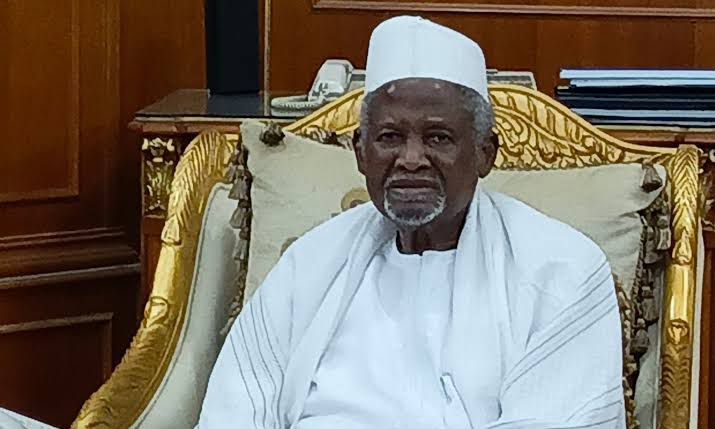Apprehension Over FG's Newly Unveiled Mechanised Agric Programme - Independent Newspaper Nigeria
Minister of Agriculture and Food Security, Sen. Abubakar Kyari.
Nigerian farmers have urged the Federal Government to provide the modalities for the sale or distribution of the 2,000 tractors recently launched by President Bola Tinubu in Abuja.
This is coming against the backdrop of anxieties over the process the newly unveiled mechanised agricultural programme of the Federal Government would take.
Recall that President Tinubu recently launched 2,000 units of high-quality tractors with trailers, plows, harrows, sprayers, and planters as well as 10 state-of-the-art combined harvesters, 12 fully equipped mobile workshops, and 50 bulldozers for agricultural land development in Nigeria.
Other equipment commissioned by Mr. President, included over 9,000 complimentary implements and sets of spare parts.
Tinubu, who commissioned these tractors under his administration’s Renewed Hope Agricultural Mechanisation Programme, said it was designed to cultivate over 550,000 hectares of farmland, generate more than two million metric tons of staple food, create over 16,000 jobs, and directly benefit more than 550,000 farming households across all six geo-political zones in Nigeria.
He reiterated the resolve of his administration to achieve food security through the deployment of agricultural mechanisation in the country.
Speaking with Sunday Independent in Abuja, Arc. Kabir Ibrahim, National President of All Farmers Association of Nigeria (AFAN), described the initiative as “a very welcome development,” adding that the farmers had been waiting eagerly for the modalities of the sale or distribution of the farm machinery.
On whether the provision of these tractors would scale up food production and reduce the high rate of food inflation in the country, Ibrahim said: “We believe in the simple laws of economics, which encapsulate that the more the availability, the more the affordability, even if the demand remains high.
“We firmly believe that mechanisation will help the scaling of productivity which will certainly bring down inflation due to increased availability.
“To sustainably improve food sufficiency and therefore bring about food security, we need to transparently manage or implement the mechanisation window opened through the Renewed Hope Agricultural mechanisation.”
He further pointed out that the programme of mechanisation was work in progress, adding that the 2,000 tractors would be augmented by the John Deer and Green Imperative supply later.
He expressed optimism that Nigeria’s mechanisation programme would remain on course until it reached a crescendo.
On the affordability of these tractors by small holder farmers, Ibrahim acknowledged that tractors were very costly, while advising the small holder farmers to form clusters so as to utilise these tractors hiring service schemes.
On the adaptability and suitability of these tractors to Nigerian soil, the National President of AFAN, said: “There are no functional tractor manufacturing plants in Nigeria. Therefore, they are naturally imported and should be assessed in use.
“I believe these tractors will work as it is not the first time that Nigeria is receiving tractors from Belarus.”
Apart from poor agricultural mechanisation, there had been issues of insecurity, climate change, low extension services, among others, which Nigerian farmers had been grappling with.
Ibrahim, who doubles as the President, Nigerian Agricultural Business Group, said the issues militating against agricultural productivity were being addressed contiguously by the government, adding, “we only need more efforts to definitely and finally deal with them.”
In his reaction, Dr. Olukayode Oyeleye, former Media Adviser to the former Minister of Agriculture, expressed fear that some of these tractors may end up in the backyards of politicians and politically exposed persons.
On the large number of tractors purchased by the Federal Government, Oyeleye said: “We hear self-adulation about the largest import of tractors so far in this country.
“But, that stands history on its head. It is not even the number imported that matters, but how well utilised, economy, maintenance and longevity of the tractors.”
Oyeleye, an agribusiness analyst, who appeared on a live television programme, advised the Federal Government not to allow bureaucracy and red tapism to bring down the distribution of these tractors to farmers.
He underscored the need to attract youth to farming through agricultural mechanisation.
Mr. Ibe Onuoha, a farmer, called for transparency in the distribution of the tractors, warning that it should not go the way of Anchor Borrowers Programme of the Central Bank of Nigeria (CBN), which was hijacked by “briefcase farmers.”
As part of measures to ensure sustainability, he called for capacity building of farmers, who would handle these tractors and other farm implements.
He further advised the Federal Government to rise up and fight insecurity to enable farmers to return to their farmlands.
TOO LITTLE FOR A CRITICAL TIME
Bishop Herbert Ekechukwu, an economist, while speaking to Sunday Independent, noted that the programme launched on June 23, 2025 in Abuja, 2000 tractors was said to be accompanied by 9,072 assorted agricultural implements to be distributed nationwide.
He stated that the figure amounts to two tractors and 11 assorted agricultural implements to a local government area.
Dr Ekechukwu stated: “So said, the programme is expected to boost agricultural production in Nigeria and provide food security
“Secondly, it is to reduce manual labour and make agriculture more attractive to the youth and to increase efficiency of production.
“The programme is expected to support small holder farmers to enhance access to mechanised farming.”
However, Dr Ekechukwu warned: “I look at the programme with scepticism because this is not the first time we are having a beautiful blueprint or roadmap to green revolution. Our archives are full of such policies that make us weary of this one.
“General Olusegun Obasanjo, first coming as military Head of State, brought Operation Feed the Nation (OFN). President Shehu Shagari brought in the Green Revolution.
“There are also others like the Fadama project, the ADPs, and the River Basins Development Authority, among others.
“Theoretically, they look beautiful on paper. But, so far, we have seen but little achievements.
“With the astonishing high level of corruption and insecurity today, one wonders how this is going to be.
“How can we be talking about increasing agricultural production and investment without first curbing insecurity, stopping Fulani herders and farmers clashes?
“Already, the agricultural belt of Nigeria is under siege. The Fulani herders have overrun the Middle Belt. They slaughter farmers continuously with ever increasing dimensions.
“Their hectares of cultivated crops are their grazing ground. This is repeated all over Nigeria.
“How then can we have a sustainable agricultural revolution without solving this national malaise?
“Secondly, the government has no business in the business of farming. Government should provide an enabling environment and allow investors to do the business of farming.
“Looking at the tractorisation from the figure provided, it boils down to two tractors and 11 assorted agricultural implements to a local government area. This is a far cry from needed implements.”
Dr Ekechukwu believed that the release of the tractors and other farm implements was a right step in the right direction to boost agricultural production.
Dr Victor Mathew, a security expert and Executive Director, Kingdom Advocacy Network (KAN), stated: “A nation that cannot feed itself is not fit to be among the comity of nations.
“Nigeria is currently facing a food crisis and food inflation, especially because of herdsmen problems, concrete efforts must be made to address this challenge and improve food production.
“I think the 2,000 tractors injected into the system is not enough in a population of over 200 million persons. The Federal Government should do more, subsidy removal has placed so much resources at their disposal.
“The crisis we have at hand is beyond 2,000 tractors. The government must have a marshal and integrated plan to boost food production.
“The government must create the enabling environment to attract people to go into agriculture. The agricultural value chain must be affected. If not, the 2,000 tractors won’t have positive impact
“How can the tractors even be used when farmers are afraid to go to the farms?
In conclusion, mere 2,000 tractors are good, but obviously are not enough to deal with the food crisis and food inflation.”
You Might Be Interested In












